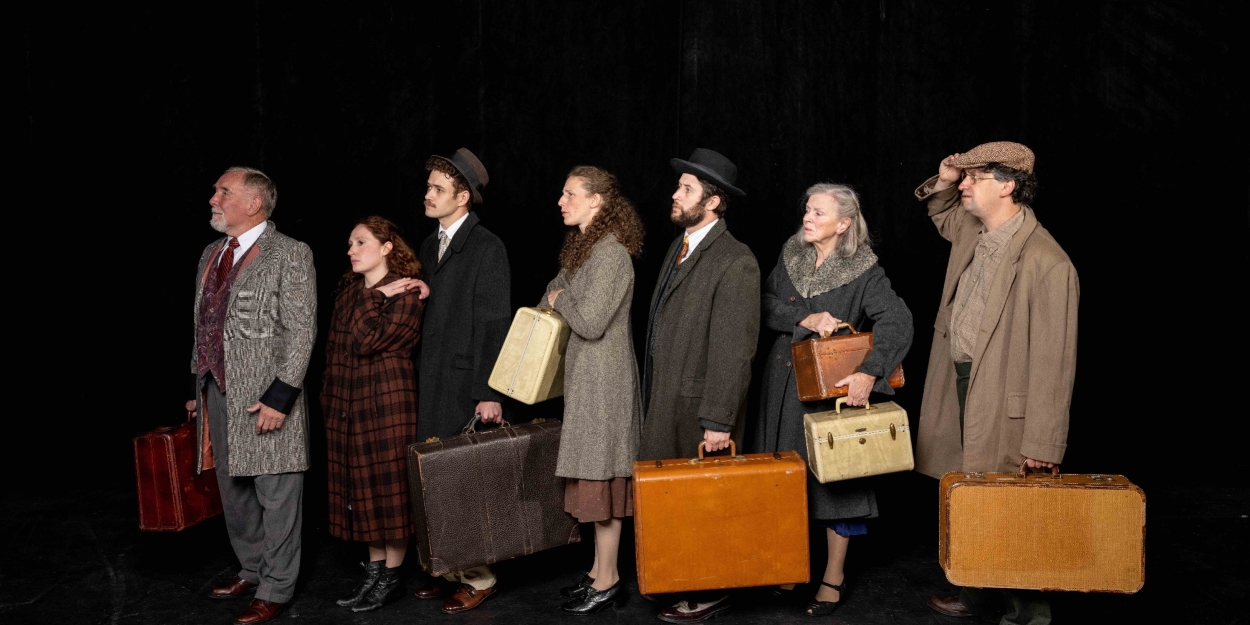Review: INDECENT at Riffe Center
INDECENT, the story about the fates of the cast of Sholem Asch's THE GOD OF VENGEANCE, runs Nov. 6-20 at the Riffe Center.

That's the thing about theatre. Sometimes you don't need expensive costumes, a lavish stage, or flashy pyrotechnics.
All you need is a really good story.
And CATCO theatre has found that really good story in INDECENT. It's staged simply but performed powerfully by its talented nine- member cast.
INDECENT, the story about the fates of the cast of Sholem Asch's THE GOD OF VENGEANCE, runs Nov. 6-20 at the Riffe Center (77 S. High Street in downtown Columbus).
Written by Paula Vogel, the show within a show spans nearly 50 years, most of the major cities of Europe as well as New York City, and themes as vast as censorship, religion, the Holocaust, and gay discrimination in 90 minutes. And like many of CATCO's performances, it gives its audience plenty to ponder on the ride home.
In 1906, young poet Sholem Asch (Ben Tracy) pens his first play THE GOD OF VENGEANCE, the story of Yekel Tchaftchovitch (Phillip Wells), a Jewish patriarch who runs his family upstairs and a brothel downstairs in his home. The script features a love affair between daughter Rivkele (Becky Keeshin) and Manke (Cassandra Bissell), one of Tchaftchovitch's basement employees and became notorious in the 1920s for featuring the first lesbian kiss.
From the moment Asch presents the play to his mentors, GOD OF VENGEANCE is polarizing at best, scandalous at worst. His fellow writers refuse to read the script for its depiction of a fellow Jews.
One of the critics, Nakhmen (Ryan Bernstein) states, "You are representing our people as prostitutes and pimps!"
Asch responds, "Some of our people are."
Despite his peers' misgivings, Asch takes his show on the road and finds receptive audiences in Berlin, Constantinople, St. Petersburg.
Then, Asch takes the show to New York City, where it is met with discrimination, censorship, and eventually, shut down by the police because of obscenity charges. Many of the cast sent back to 1938 Poland.
Under the direction of Leda Hoffmann, the cast of the show bring the true story of this show to life. Each actor taking on multiple roles and even the trio of Jeff Rolland (clarinet), Mathew Kinnear, (violin), and Marian Funk (accordion) playing roles in the show as well as providing the soundtrack.
While playing Asch and playwright Eugene O'Neill, Tracy provides the show's head and Benny Zelkowicz, the narrator of the show as the unlikely stage manager Lemml or "Lou," is its heart. For every reason Asch provides to pour petrol on the script, Lemml reminds him of what the show means to others.
However, on the eve of returning to Europe, Lemml delivers a painful indictment on the freedom of speech in America: "I am done being in a country that laughs at the way I speak. They say America is free? What do you know here is free? All over Europe we did this play with no Cossacks shutting us down."
Keeshin is a wonder playing Chana, Asch's wife, and two actresses who land the role of Rivkele. In one scene, Keeshin is fired as the shy actress who originated the role because she can't speak enough English to do the role. Minutes later, she returns as Virgina, a starry-eyed Smith College student who replaced the originator. After Keeshin's character confesses that she basically took the role of Rivkele to shock her parents, Dorothee (Bishell) asks, "What will shock your parents the most: that you are playing in a Jewish company? That you are playing a Jewish girl? Or that you are playing a girl in love with a prostitute?
Virginia answers with a laugh, "I hope all of it!"
Wells conducts a master class in character acting as he switches personas while jumping from Otto, the actor who plays Tchaftchovitch, to Tchaftchovitch to a judge, to an older version of Asche. Wells delivers one of the most powerful lines of the play near the end. After John Rosen (ironically played by Tracy) approaches him in the 1950s to revive GOD OF VENGEANCE, Asche asks Rosen if he's ever lost an audience. When Rosen replies that of course he has, Asche throws down this dagger: "I too have lost audience members. Six million have left the theater. I am sorry to waste your time. I will not let this play be produced."
Bisshell, Anne J. McEvoy, and Bernstein also flourish juggling multiple roles.
The play is almost void of scenery and props, using mostly suitcases and trunks to provide most of the transitions between scenes. However, Hoffmann pulls out a few stunning visual tricks. At the beginning of the play, the characters rise from their seats like ghosts. At the end of it, Rivkele and Manke recreate a key scene of THE GOD OF VENGEANCE, dancing beneath a waterfall in the middle of the Riffe Center.
Although few shows have been shut down for obscenity, INDECENT's messages of acceptance and presenting perhaps unpopular messages boldly in the face of harsh criticism still ring true.
Wells' character Peretz says at the beginning of the play, "We need to have a civil discourse no matter what the young men in my living room do. Or write."
INDECENT is a poignant reminder of how dead on Peretz's statement can be.
INDECENT has eight shows remaining at the Studio One, Riffe Center (77 S. High Street in downtown Columbus), including 7:30 p.m. performances on Nov. 10 and 17, 8 p.m. performances on Nov. 11-12 and 18-19, and 2 p.m. matinees on Nov. 13 and 20. Call (614) 469-0939 for ticket information.
Reader Reviews
Videos

